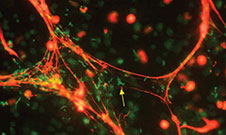Details
- Close date
- Friday, 23 February 2018
- Academic background
- Sciences, Health Sciences
- Host campus
- Christchurch
- Qualification
- Honours
- Department
- Pathology and Biomedical Science (Christchurch)
- Supervisors
- Dr Heather Parker, Professor Mark Hampton
Overview
 Example of bacteria (green) trapped on NETs (orange)
Example of bacteria (green) trapped on NETs (orange)
Pneumonia is a serious infectious disease that is the fourth leading cause of death globally. Deaths are primarily due to bacterial infections, particularly infection with Streptococcus pneumoniae. During pneumonia our immune system struggles to contain this pathogen. S. pneumoniae and other bacteria can be trapped in structures released by white blood cells called neutrophil extracellular traps (NETs). Interestingly, S. pneumoniae produces the chemical hydrogen peroxide as a normal metabolic by-product. Hydrogen peroxide by itself is not very toxic, however, it can be converted into bleach and other bactericidal oxidants by enzymes present on the NETs. The importance of these reactions has not been considered before. However, these oxidants could affect the viability of the bacteria and also the function of neighbouring host cells.
Hypothesis
Hydrogen peroxide produced by S. pneumoniae is converted by enzymes found on NETs into compounds that can kill bacteria and alter the function of host cells.
Aims
- Measure the oxidants produced when S. pneumoniae are bound to NETs
- Determine whether these oxidants kill S. pneumoniae and other strains of bacteria
Methods
This project, which is funded by the Health Research Council, will use a variety of techniques including colony forming unit assays to measure bacterial viability, fluorescence and live cell microscopy to show bacteria trapped on NETs, and biochemical assays to measure oxidant production.
Preferred student expertise
This project would suit an enthusiastic student with a background in biochemistry and/or microbiology.
Further information
This project is one of the many available for the 2018 intake of BBiomedSc(Hons) at the University of Otago, Christchurch campus.
- Visit the University of Otago, Christchurch website for more information about the Honours programme.
- Visit Dr Heather Parker's staff profile
- Visit Professor Mark Hampton's staff profile
Useful information
Similar research opportunities
- Antibiotic failure in tuberculosis due to interactions with myeloperoxidase, an enzyme released by immune cells
- Identifying the mechanism of action of a marine-derived anticancer compound
- Amyloids of p16 in cancer
- Antibiotic failure in tuberculosis due to interactions with myeloperoxidase, an enzyme released by immune cells
- Antibiotic failure in tuberculosis due to interactions with myeloperoxidase, an enzyme released by immune cells







